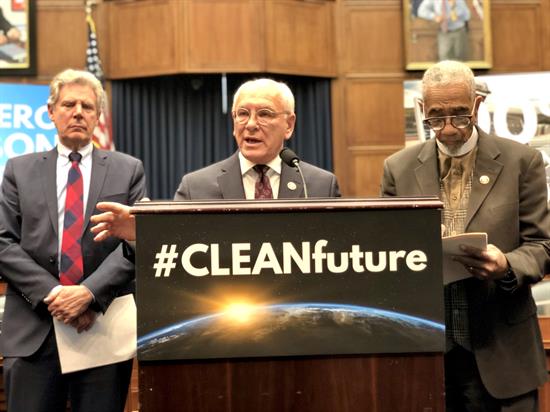- Home
- About
-
Constituent Services
- Academy Nominations
- Community Project Funding
- Congressional Art Competition
- Congressional App Challenge
- Congressional Commendation
- Event Invitation
- Grants
- Help with a Federal Agency
- Internships
- IRA Clean Energy Consumer Benefits
- Know Your Rights: Immigration
- Request a Meeting
- Request Surplus Books
- Presidential Greeting
- Visit Washington D.C.
- Issues & Legislation
- News
- 20th District
- Contact

Press Releases
Tonko Leads Congressional Hearing on Environmental Justice BillsEnvironment & Climate Change Subcommittee examine CLEAN Future Act, other legislation to drive equitable energy transition
Washington,
April 15, 2021
WASHINGTON—Congressman Paul D. Tonko, Chair of the Energy and Commerce Subcommittee on Environment and Climate Change, led the subcommittee in a legislative hearing on facilitating the nation’s clean energy transition and promoting environmental justice to protect vulnerable communities. The 11 bills examined during the hearing included Tonko’s Climate Leadership and Environmental Action for our Nation's (CLEAN) Future Act, which he introduced this year alongside Energy and Commerce Committee Chairman Frank Pallone, Jr. (D-NJ), and Energy Subcommittee Chairman Bobby L. Rush (D-IL). Read Rep. Tonko’s full opening statement below. OPENING REMARKS I believe members of this committee would agree that all Americans should be able to have clean air, clean water, and lives free from pollution. Unfortunately, this has not been the case throughout our history, and it is not the case today. And the burdens of this exposure have not been distributed equally or randomly. The Americans who have paid the highest price for this pollution have mostly been people of color and low-income communities. Their exposure to pollution has resulted in higher rates of respiratory illnesses, cancer, and premature death. And the consequences ripple out much further. For example, impacted communities tend to have greater vulnerability to damage and hardship caused by our climate inaction. In recent years, this subcommittee has taken a leading role in reversing these trends. Many members have championed efforts to right these historic injustices and support investments, public health protections, and pollution reductions in the communities that need them most, regardless of race, income, or zip code. Today’s legislative hearing is an opportunity to examine some of these efforts. Our focus today includes Title 6, Subtitle F of Title 4, and Section 842 of the Committee’s CLEAN Future Act. But of course, the CLEAN Future Act was not developed in a vacuum. It builds on input, ideas, and provisions from many stakeholders and Members of Congress. That spirit of partnership has made the CLEAN Future Act much stronger, and it is my hope that these improvements will continue today and in future hearings. In addition to the CLEAN Future Act, today’s hearing will look at 10 bills to address aspects of environmental justice. I want to recognize and thank subcommittee members DeGette, Clarke, Ruiz, Barragán, McEachin, and Blunt Rochester for their work on these bills and commitment to putting environmental justice at the heart of our subcommittee’s work. I share their commitment and look forward to working with all of our members to make sure the 117th Congress isn’t merely a Congress for climate action, but a Congress for just and equitable climate action. And I have been pleased that starting with President Biden’s Executive Order on Tackling the Climate Crisis at Home and Abroad, the Administration has made a commitment to enhancing environmental justice. But these goals will not be achievable unless we act through an inclusive process that allows community organizations and people most affected by pollution to be involved. This means having community voices in the development, consideration, implementation, and enforcement of our nation’s environmental laws. Today’s hearing is part of that. In that spirit, I welcome our witnesses, and I thank the many environmental justice advocates who have taken time to meet with members and our staffs to share your perspectives. Because our goals depend on listening to the communities that have faced these disproportionate impacts and have been shut out of participation in processes for decades. No one bill will undo the generations of injustices, racism, and discrimination against frontline communities. That is why we need a comprehensive strategy that deals with disproportionate impacts and supports the revitalization of communities, which will come from reducing and remediating pollution. That is why today’s hearing includes coal ash protections, lead service line replacements, brownfield and Superfund remediations, and traditional air pollutants. We will also consider legislation to reduce emissions from ports, to deploy air pollution monitoring infrastructure, and build capacity of community-based organizations to enable greater participation in environmental and infrastructure decision making processes. These bills also propose ways to strengthen and improve public participation, codifying Executive Order 1.2.8.9.8. and its requirements for integration of environmental justice across federal agencies, requiring E.J. training of federal employees and meetings between EPA and community groups to improve collaboration and communication. Finally, the CLEAN Future Act, much like the Biden Administration’s commitment, requires that 40% of funds made available be used to support activities directly benefitting environmental justice communities. I look forward to today’s discussion and yield back my time.
|
